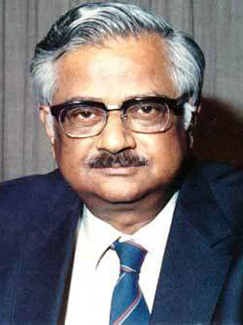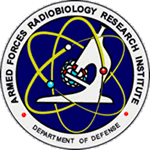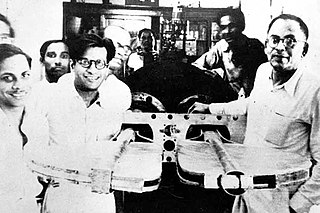Related Research Articles

The Defence Research and Development Organisation (DRDO) is an agency under the Department of Defence Research and Development in Ministry of Defence of the Government of India, charged with the military's research and development, headquartered in Delhi, India. It was formed in 1958 by the merger of the Technical Development Establishment and the Directorate of Technical Development and Production of the Indian Ordnance Factories with the Defence Science Organisation under the administration of Jawaharlal Nehru. Subsequently, Defence Research & Development Service (DRDS) was constituted in 1979 as a service of Group 'A' Officers / Scientists directly under the administrative control of the Ministry of Defence.

Raja Ramanna was an Indian nuclear physicist. He was the director of India's nuclear program in the late 1960s and early 1970s, which culminated in Smiling Buddha, India's first successful nuclear weapon test on 18 May 1974.

The Bhabha Atomic Research Centre (BARC) is India's premier nuclear research facility, headquartered in Trombay, Mumbai, Maharashtra, India. It was founded by Homi Jehangir Bhabha as the Atomic Energy Establishment, Trombay (AEET) in January 1954 as a multidisciplinary research program essential for India's nuclear program. It operates under the Department of Atomic Energy (DAE), which is directly overseen by the Prime Minister of India.

The Department of Atomic Energy (DAE) is an Indian government department with headquarters in Mumbai, Maharashtra, India. DAE was established in 1954 with Jawaharlal Nehru as its first minister and Homi Bhabha as its secretary.

The Armed Forces Radiobiology Research Institute (AFRRI) is an American triservice research laboratory in Bethesda, Maryland chartered by Congress in 1960 and formally established in 1961. It conducts research in the field of radiobiology and related matters which are essential to the operational and medical support of the U.S. Department of Defense (DoD) and the U.S. military services. AFRRI provides services and performs cooperative research with other federal and civilian agencies and institutions.

Daulat Singh Kothari was an Indian scientist and educationist.

The Defence Institute of Advanced Technology (DIAT) is the premier engineering training institute under the Department of Defence Research & Development, Ministry of Defence, and Government of India. DIAT (DU) provides higher education to civilians and officers from Defence Research Organizations, IOFS, Defence PSUs, ship building agencies, Mazagon Dock Shipbuilders, armed forces of friendly countries, and other central and state governmental agencies.
The Defence Scientific Information & Documentation Centre (DESIDOC) is a division of the Defence Research and Development Organisation (DRDO). Located in Delhi, its main function is the collection, processing and dissemination of relevant technical information for DRDO scientists. The present director of DESIDOC is K Nageswara Rao.
Terminal Ballistics Research Laboratory (TBRL) is a laboratory of the Defence Research and Development Organisation (DRDO) which comes under Ministry of Defence. Located in Chandigarh, the laboratory has become one of the major DRDO labs in the field of armament studies. TBRL is organized under the Armaments Directorate of DRDO. The present director of TBRL is Shri. Prateek Kishore.
Defence Institute of Psychological Research (DIPR) is an Indian defence laboratory of the Defence Research & Development Organisation (DRDO). Located in Delhi, its main function is research in the area of psychology for armed forces personnel. DIPR is organised under the DRDO's Directorate of Life Sciences (DLS). The present director of DIPR is Dr. Arunima Gupta.
Defence Research & Development Establishment (DRDE) is an Indian defence laboratory of the Defence Research and Development Organisation (DRDO). Located in Gwalior, it is primarily involved in the research and development of detection and protection against toxic chemical and biological agents. DRDE is organised under the Life Sciences Directorate of DRDO. The present director of DRDE is Dr. Manmohan Parida.
The Defence Institute of Physiology & Allied Sciences (DIPAS) is an Indian defence laboratory of the Defence Research and Development Organisation (DRDO). Located in Delhi, it conducts physiological and biomedical research to improve human performance in extreme and wartime environments. DIPAS is organized under the Life Sciences Directorate of DRDO. The present director of DIPAS is Dr. Rajeev Kumar.
Bilikere Srinivasa Rao Dwarakanath is a molecular biologist and a radiation biologist, working on 2-Deoxy-D-glucose therapy in cancer research. His current research interests are experimental oncology, radiobiology, biological radioprotection and cell signaling in cancer therapy. He is currently the Joint Director of the Institute of Nuclear Medicine and Allied Sciences (INMAS), DRDO, Head, Division of Radiation Biosciences, INMAS, and Adjunct Faculty at the Dr. B. R. Ambedkar Center for Biomedical Research (ACBR), University of Delhi.
Defence Laboratory, located in Jodhpur, is a strategically important laboratory of the Defence Research and Development Organisation (DRDO).
India has studied, produced and used various strategic and tactical missile systems since its independence. Decades long projects have realised development of all types of missile systems including ballistic, cruise, anti-ship, air-defence, air-to-air and anti-missile systems. India is one of seven countries in the world with intercontinental ballistic missiles (ICBMs) and one of four countries with anti-ballistic missile systems. Since 2016, India has been a member of Missile Technology Control Regime (MTCR).

Basanti Dulal Nag Chaudhuri was an Indian Nuclear scientist and academic, and Scientific Advisor to the Ministry of Defence, Government of India. He is known as one of the pioneers of nuclear physics in India. While serving as the Director General to the Defence Research and Development Organisation (DRDO), he played influential role in Pokhran-I , India's first successful Nuclear bomb test on 18 May 1974. He also initiated the first feasibility studies on India's ballistic missile program.
N. Prabhakar was an Indian scientist and the Chief Controller, System Analysis and Modelling Centre (SAM-C) of the Defence Research and Development Organization (DRDO). He graduated in Electrical and Electronics Engineering (BE) from Annamalai University and enrolled at the Indian Institute of Science, Bengaluru from where he obtained his master's degree (ME). He pursued his research at Shanmugha Arts, Science, Technology & Research Academy, secured a doctoral degree in Air Defence Systems and joined the Defence Research and Development Laboratory (DRDL) in 1980.

The Rudram is a series of supersonic and hypersonic air-to-surface ground attack and anti-radiation missiles in development by the Defence Research and Development Organisation of India. It can be launched from a range of altitudes with large standoff distance for destroying enemy surveillance radars, communication stations and bunkers.
Defence Research & Development Service (DRDS) is a Central Group 'A' Civil Service of the Government of India. DRDS scientists are Gazetted defence-civilian officers under the Ministry of Defence. They are responsible for developing new technologies and military hardware for the Indian defence and security forces.

Harsh Vardhan Batra is an Indian scientist working in animal biotechnology at the Department of Biotechnology (DBT), of the Indian Ministry of Science and Technology. He is a former director of the Defence Food Research Laboratory (DFRL), a Defence Research and Development Organisation (DRDO) establishment at Mysore. As a specialist in infectious diseases, he participated in the DRDO biodefence preparedness program, and was an expert member of the technical advisory committee on plague constituted by the government of India in September 1994. He served as technical consultant for the design and construction of high containment laboratories for DRDO, the Indian Council for Agricultural Research (ICAR) and Indian Council of Medical Research (ICMR). He participated in the United Nations Biological Weapons Convention (BTWC) ad hoc group meetings in Geneva as a member of the Indian delegation, and conducted World Health Organization (WHO) Southeast Asia Regional Office meetings and workshops on infectious diseases.
References
- ↑ "Quick response team to handle nuke blast". Outlook . 18 November 2004. Retrieved 16 February 2012.
- ↑ Multidisciplinary laboratory of DRDO
- ↑ Major activities of Department